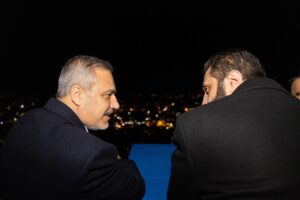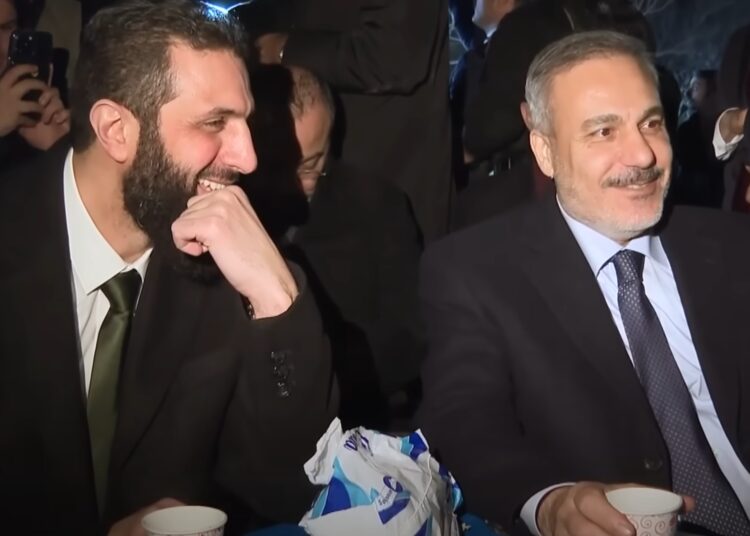Abdullah Bozkurt/Stockholm
Anas Hasan Khattab, the newly appointed 38-year-old director of Syria’s General Intelligence Service (Al-Mukhabarat al-Amma, GIS), has maintained a close relationship with Turkey’s National Intelligence Organization (Milli İstihbarat Teşkilatı, MIT), dating back to his time overseeing al-Qaeda operations in Syria.
Despite being designated a terrorist by the United States in 2012 for his ties to the al-Nusra Front and sanctioned under the UN Security Council’s al-Qaeda sanctions list in September 2014, Khattab’s case reveals Turkey’s covert defiance of the UN resolution and disregard for the designation by the US, its key NATO ally.
Khattab was recruited by MIT’s Special Operations Directorate (Özel Operasyonlar Başkanlığı), under the leadership of Kemal Eskintan, a former military officer known to jihadist groups by the nom de guerre of Abu Furqan. As the head of the department, Eskintan played a key role in Turkey’s covert operations to support armed jihadist factions throughout the Middle East and Africa, some of which closely aligned with the political objectives of Turkish President Recep Tayyip Erdogan’s government.

While MIT was secretly collaborating with Khattab, Turkey’s Interior Ministry, which oversees the country’s largest law enforcement agency, took a starkly different stance. In a 2021 report issued by the ministry, Khattab was designated as affiliated with the Islamic State in Iraq and Syria (ISIS). The report, crafted to reassure critics of Turkey’s commitment to combating ISIS, outlined Khattab’s activities in Syria.
The Turkish cabinet’s decision to sanction Anas Hasan Khattab came very late and proved largely ineffective in practice:
According to the report, Khattab was part of a six-member team led by Ahmed al-Sharaa, also known as Abu Muhammad al-Jolani, who is now the de facto leader of Syria. In August 2021, al-Sharaa was tasked by Abu Bakr al-Baghdadi, the then-leader of ISIS, to establish the group’s Syrian branch. While al-Sharaa was founding the Nusra Front in 2012, Khattab played a critical role as his deputy. The two men split from ISIS in 2014 and pledged their allegiance to al-Qaeda.
In coordination with Turkish intelligence, al-Sharaa rebranded the Nusra Front in 2016, first declaring a severance of ties with al-Qaeda and changing the name to Jabhat Fateh al-Sham (JFS). In January 2017, JFS was again renamed as Hay’at Tahrir al-Sham (HTS), when it incorporated other groups into its ranks.
A 2021 Turkish Interior Ministry report on ISIS details the terrorist activities of Ahmed al-Sharaa, also known as Abu Muhammad al-Jolani, and his deputy, Anas Hasan Khattab. The document highlights their involvement in terrorism, particularly in Syria and their connections to jihadist networks:
HTS has operated in Syria’s Idlib province under the protection of the Turkish military, which currently controls areas near the Turkish border in the north and northeast of Syria. The group has generated revenue through taxes on cross-border trade with Turkey, procured supplies and weapons via Turkish channels, raised funds using Turkey’s financial and banking systems and even recruited new fighters from among the Syrian refugee communities sheltered in Turkey.
Since the time HTS was granted sanctuary in Idlib under the protection of President Erdogan’s Islamist government, Khattab, serving as the head of the intelligence and general security apparatus within the group, has acted as the liaison with Turkish intelligence.

The Turkish government long avoided designating Khattab a terrorist under Turkish law, despite UN Security Council Resolution 1267/2253, which mandates asset freezes, travel bans and arms embargoes on individuals and entities linked to al-Qaeda and later, ISIS. This resolution required Turkey to take action against designated terrorists, yet it has refrained from implementing these sanctions in Khattab’s case.
The Erdogan government deliberately ignored both the US designation of Khattab as a terrorist in 2012 and his listing by the UN in 2014. It was only after increasing international pressure on Turkey for its lenient approach to jihadist groups that President Erdogan agreed to sanction Khattab in a cabinet meeting on November 7, 2016. However, the decision did not take effect until it was officially published in the government gazette on November 24, 2016.
Yet, despite the formal sanctioning, nothing truly changed in terms of Turkish intelligence’s secret cooperation with Khattab and their clandestine collaboration continued unhindered.
A similar tactic was applied to al-Sharaa as well. Although the UN Security Council designated him a terrorist in July 2013, the Erdogan government only officially listed him as a terrorist on December 14, 2015. Despite this, al-Sharaa has continued to coordinate his actions with Turkish authorities.
The Turkish cabinet’s decision to list HTS leader Ahmed al-Sharaa, also known as Abu Muhammad al-Jolani, as a terrorist in 2015 was little more than window dressing, designed to give the appearance of compliance without substantive action:
A significant amount of secret coordination between MIT and HTS was publicly, and perhaps inadvertently, revealed by Turkey’s Foreign Minister Hakan Fidan, who had forged ties with Khattab while heading the intelligence agency until 2023. During an interview with the French state-owned television channel France 24 on December 20, 2024, Fidan admitted to having worked with HTS in secrecy.
“We’ve had excellent cooperation [with HTS],” said Fidan, claiming that the group had provided intelligence on ISIS leadership. “They helped us a lot, but because of the sensitivities, we didn’t make it public at that time,” he added.
By revealing the active cooperation and collaboration with HTS, Fidan essentially admitted that the Turkish government had violated international laws that prohibit engagement with UN-designated terrorist groups. This disclosure also suggests that Fidan and the intelligence agency violated Turkish law, as both Khattab and al-Sharaa were, albeit belatedly, placed under sanctions within Turkey’s legal framework.
By law, Turkish intelligence is permitted to engage with terrorist groups for activities such as infiltration, intelligence gathering and negotiation, but it is strictly prohibited from facilitating the operations of these groups or aiding and abetting in any terrorist activities. However, such laws and regulations seemingly held no weight under Fidan’s leadership of MIT. This policy was approved by President Erdogan, who has not concealed his sympathy for jihadist groups.
As a result, the delayed listing of Khattab and al-Sharaa as terrorists by the Turkish cabinet amounted to little more than window dressing, aimed at deceiving Turkey’s allies and partners into believing that the Erdogan government had changed its policy regarding al-Qaeda groups in Syria. In reality, however, nothing had changed.
The Erdogan government has shipped thousands of trucks loaded with arms and ammunition to jihadist groups in Syria over the years, providing them with logistical support as well as intelligence support. In fact, a criminal investigation launched by public prosecutors in January 2014 revealed that MIT was secretly transporting not only arms but also foreign fighters to Syria, in open defiance of Turkey’s anti-terrorism laws.

After the scandalous expose, the Erdogan government swiftly intervened in the criminal investigations, derailing the probes by dismissing prosecutors, police chiefs and military commanders involved in investigating the unlawful arms transfers along the Turkish-Syrian border expedited by Turkish intelligence. Since then, thousands of judges, prosecutors and police officers have been dismissed by the Erdogan government, which also ordered a complete halt to all al-Qaeda-related investigations across Turkey.
With the fall of the regime of Syria’s President Bashar al-Assad, facilitated by the rise of al-Sharaa’s jihadist group and diminished support from Russia and Iran, Turkish intelligence has intensified its efforts to infiltrate Syrian institutions. The goal seems to be the establishment of a parallel or shadow government, designed to influence policies in Damascus.
Khattab’s appointment as the head of intelligence in Syria marks a significant achievement for the Erdogan government. Just as President Erdogan relies heavily on MIT to control the country, undermine his opposition and orchestrate influence and false flag operations to shape both national and international agendas, he intends to use Khattab’s intelligence service to pursue similar objectives in Syria.
In Idlib province, MIT has demonstrated effective collaboration with Khattab and his superior, al-Sharaa, dating back years before the fall of Assad. Whether this level of coordination can be replicated at the national level and to what extent it can overcome the deep economic, sectarian and security challenges facing Syria, remains to be seen.
There remains a risk of a boomerang effect that cannot be completely dismissed. It is certainly not inconceivable that Syrian jihadists, emboldened by their unexpected victory, may choose to turn on their masters in Ankara and pursue their own agendas, potentially undermining President Erdogan’s regional ambitions.
Much like Pakistan’s Inter-Services Intelligence, which armed and supported jihadist groups in Afghanistan for years only to face the wrath of similar groups within its own borders, Turkey may also encounter serious consequences from its engagement with dangerous jihadist factions in Syria. In the future, Turkey could experience increased militancy and instability, particularly in its border regions, as it faces the blowback from playing with fire.












